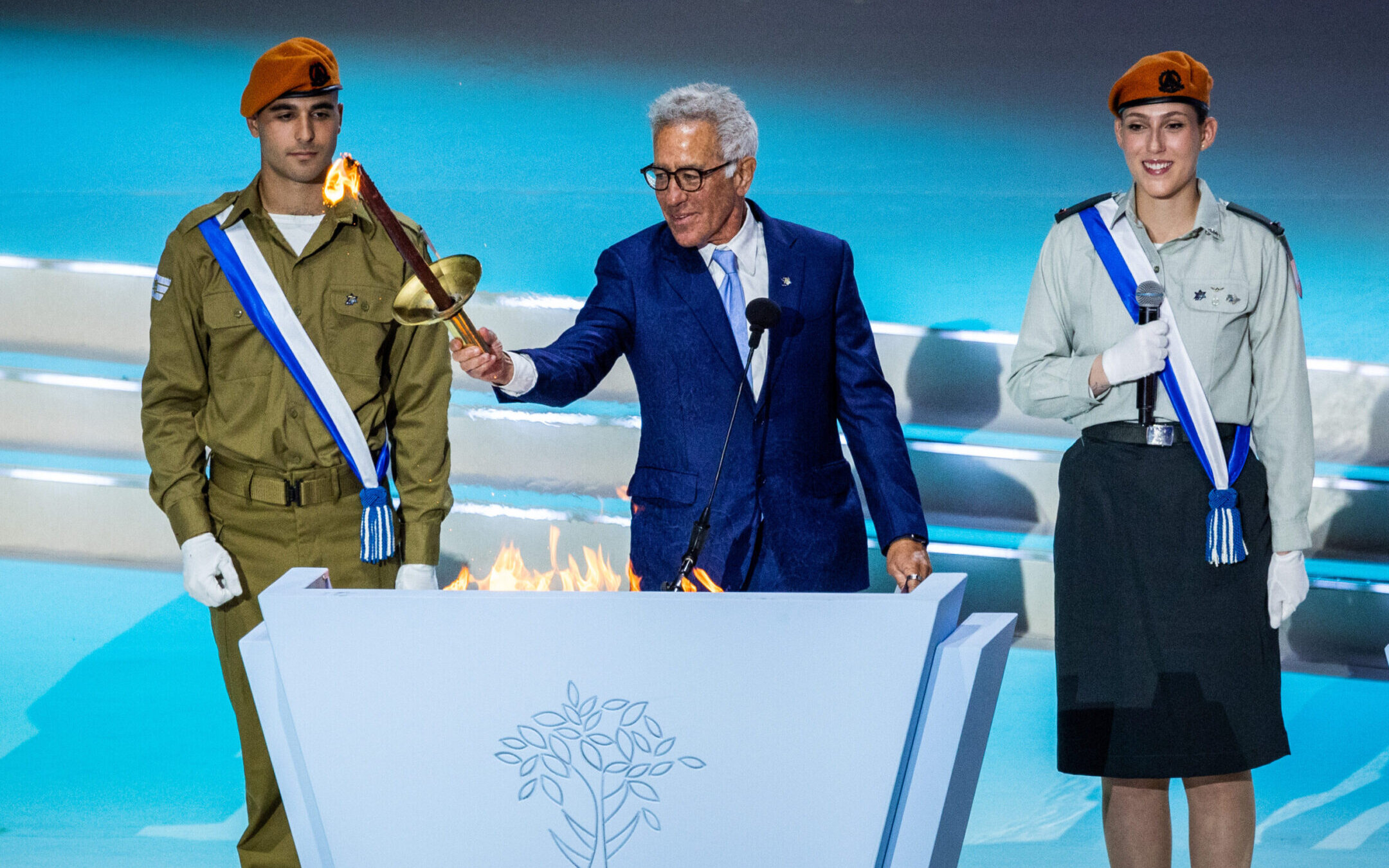Sylvan Adams, philanthropist known for boosting cycling in Israel, gives $100M to help Ben-Gurion U after Oct. 7
The gift is the largest ever to an Israeli university and on par with the biggest to any university anywhere

Sylvan Adams lights a torch during the reheasals for the 75th anniversary Independence Day ceremony, held at Mount Herzl, Jerusalem, April 23, 2023. (Yonatan Sindel/Flash90)
(JTA) — Canadian-Israeli businessman Sylvan Adams has donated $100 million to Ben-Gurion University as part of an effort to rebuild the south following the devastating Hamas attacks on Oct. 7, university officials announced at a benefit gala in Toronto on Sunday.
“If we want the south to flourish after the October 7th pogrom, we must invest in the south, beginning in its capital of Beersheba,” Adams told the Jewish Telegraphic Agency on Monday.
Adams, a real estate magnate who moved to Israel in 2015, is perhaps best known for his support of cycling in Israel. He established the country’s first cycling institute and velodrome, created an eponymous commuter bike path in Tel Aviv and brought the opening stage of the Giro d’Italia competition to Israel in 2018 — at a personal cost of more than $20 million. He also owns the Israel-Premier Tech Cycling Team and won the world championship in cycling for his age group last year.
Aside from cycling, Adams and his family foundation have also supported the Israel Academy of Sciences and Humanities; SpaceIL, Israel’s nonprofit space organization; and multiple medical centers in Israel. He also played a role in bringing pop star Madonna to the Eurovision song competition in Israel in 2019. He has given widely in his native Canada, as well.
The latest donation dwarfs any of that giving. The $100 million donation is the largest ever to an Israeli university and on par with the largest ever made to any university, matching splashy gifts that have been announced recently at Harvard and Duke universities in the United States.
It will go to boost a university that lost 82 members of its community on Oct. 7, including students, staff, faculty and their family members, according to a statement released by the university. The university has 20,000 students enrolled and employs 6,700 members staff, most of whom reside in the southern region.
The funds will focus on six key areas, including the future of the Negev and Israel, technological advancements, climate change, sustainability, and global health, BGU President Daniel Chamovitz told guests at the Negev Strong gala, which was hosted by the university’s Canadian fundraising arm, according to the statement.
Describing BGU as Israel’s “most important university,” Adams, who moved to Israel in 2016, cited its research in several sustainability arenas, including water management, solar energy, desert ecology, and climate change solutions – especially through its campus at Sde Boker, the desert kibbutz that was the retirement home of the country’s first prime minister and the university’s namesake.
Adams pointed to David Ben-Gurion as someone who “understood that the Negev is the beating heart of Israel.”
“One of our responses to the terrible October 7th attack and the rise of lies about Israel and antisemitism around the world must be to dedicate ourselves to Jewish values as a force for good,” Adams told JTA. “We build, while Hamas destroys. We teach our children to love, while they teach theirs hatred.”
The donation marks a significant investment in the future of Israel’s southern region and is seen as a beacon of hope and renewal after Oct. 7, according to Mitchell Oelbaum, president of Ben-Gurion University Canada. It comes as the country has a strengthened attachment to the region and as the mounting costs of war leave open questions about how prepared the Israeli government can be to make unrelated new investments in the near future.
“Our students, staff, and faculty persevered in the face of one of our country’s darkest moments,” Oelbaum said. “This gift comes at the perfect time for renewal.”
This article originally appeared on JTA.org.















